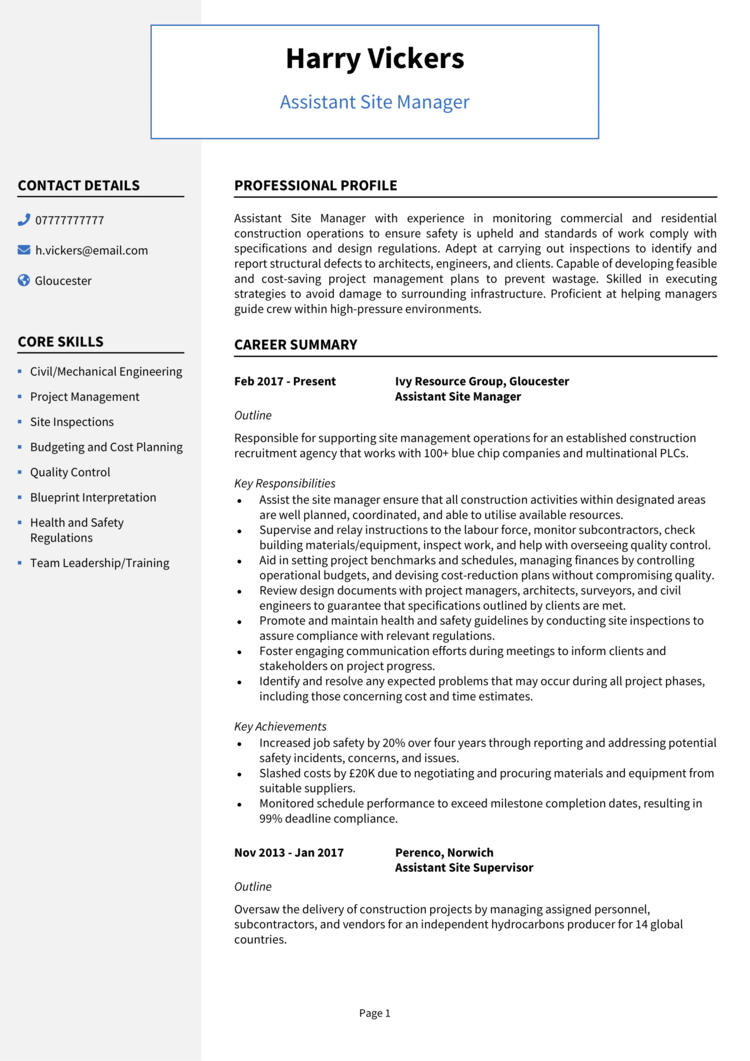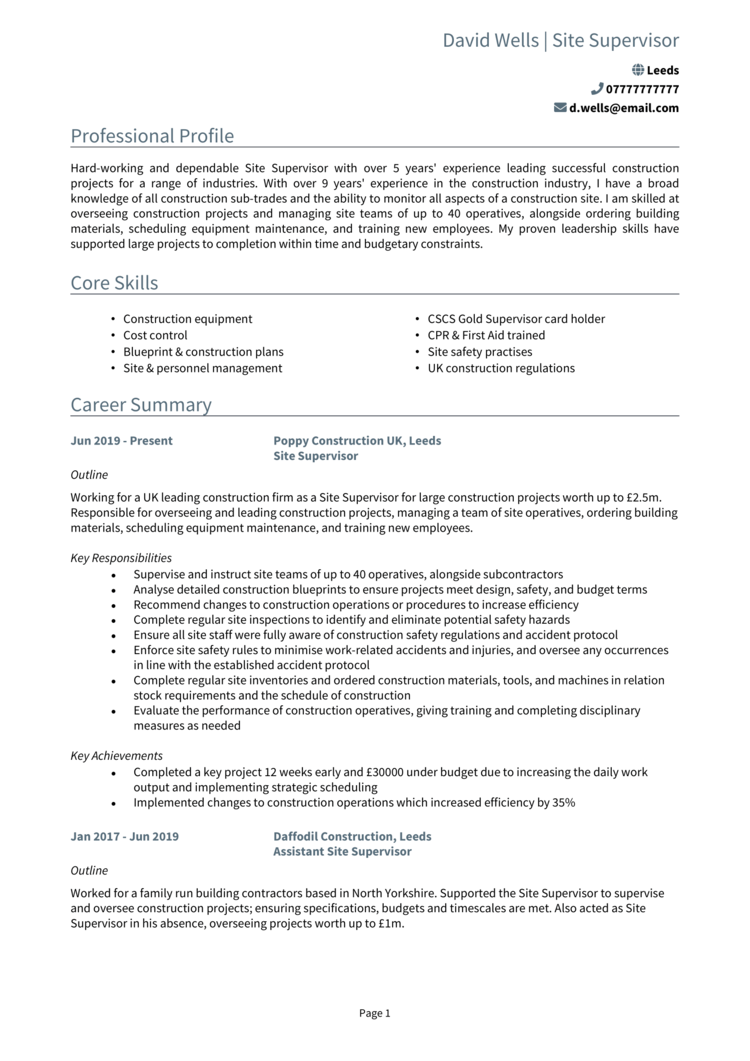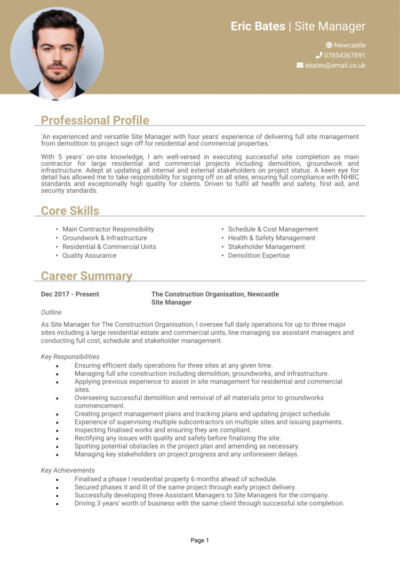When a site runs smoothly, nobody stops to think about it – but as a Site Manager, you know just how much goes into keeping every project on track.
It’s not just about managing schedules and signing off deliveries; you’re the one solving problems before they escalate and making sure every tradesperson knows exactly what they need to do and when.
But if your CV doesn’t show all of that, employers won’t know just how valuable you are. That’s why this guide, with its Site Manager CV examples, is here to help you lay the foundations for your next role.
Site Manager CV

Assistant Site Manager CV

Site Supervisor CV

How to write your Site Manager CV
Discover how to craft a Site Manager CV that lands interviews with this simple step-by-step guide.
A strong CV doesn’t just list tasks; it shows employers how you take control, solve problems under pressure, and make sure deadlines (and budgets) don’t slip.
This guide breaks down writing a CV that’s clear, focused, and highlights the leadership skills, and project wins that set you apart. Whether you’re managing a multi-phase development or a fast-moving refurbishment, this guide ensures your CV shows exactly why you’re the one to trust with the keys to the site.
How to create a good structure for your Site Manager CV


Site Managers need to keep everything running smoothly, from initial groundwork to final handover – your CV should demonstrate that same sense of order and efficiency. A clear, logical structure helps employers quickly find what matters most: your experience, qualifications, and leadership skills.
Here’s the layout your CV should follow:
- Name and contact details – Keep these contact details at the top so a potential employer can reach out to you.
- Profile – Immediately draw in the recruiter with a brief summary of your skills and experience.
- Core skills – Quickly list key skills such as site supervision, health and safety compliance, and subcontractor coordination.
- Work experience – Give clear breakdown of your site management roles, focusing on project size, scope, and results delivered.
- Education – Outline your relevant qualifications, certifications, and health and safety training.
- Additional info – Optionally, mention professional memberships, hobbies, or awards.
Formatting your Site Manager CV


A cluttered, unclear CV won’t impress anyone – especially in a field where precision and planning are essential. If you can’t organise your own CV, they might wonder how you’d organise a 50-person site without mistakes. Your format should make it easy for employers to quickly scan for your credentials and experience.
Here’s some formatting tips to follow:
- Bullet points – Use bullet points to present responsibilities and achievements for quick reading.
- Divide sections – Clearly label each section to make navigation simple.
- Use a clear and readable font – Just make sure it’s a clear and easy font to read.
- No more than 2 pages – This is the perfect length to cover the essentials without getting boring.
How to write a Site Manager CV profile


A CV profile introduces you as a capable Site Manager and gives recruiters a fast snapshot of your skills and experience. It should show you’ve got the leadership, technical knowledge, and problem-solving abilities to handle challenging projects, with the aim of proving that you’d make a positive impact on any site.
Site Manager CV profile examples
Profile 1
Experienced Site Manager with five years of expertise in overseeing construction projects, ensuring health and safety compliance, and managing on-site teams. Skilled in coordinating subcontractors, monitoring project timelines, and maintaining quality control. Proficient in using project management tools such as Procore and AutoCAD. Committed to delivering high-quality construction projects on time and within budget.
Profile 2
Results-driven Site Manager with over four years of experience managing large-scale commercial and residential developments. Adept at scheduling work, supervising teams, and liaising with clients and stakeholders. Experienced in risk assessment, procurement, and cost management. Dedicated to maintaining high safety standards and ensuring efficient site operations.
Profile 3
Skilled Site Manager with six years of expertise in infrastructure and civil engineering projects. Proficient in managing site logistics, enforcing safety regulations, and coordinating with architects and engineers. Strong background in handling permits, inspections, and site audits. Passionate about ensuring smooth project execution and achieving operational efficiency.
Details to put in your Site Manager CV profile
Here’s what to include:
- Site management experience – Mention the types of projects you’ve overseen, such as commercial builds or housing developments.
- Leadership and coordination – Emphasise your ability to lead teams and manage subcontractors effectively.
- Health and safety knowledge – Showcase your commitment to safe working practices and regulatory compliance.
- Problem-solving and decision-making – Highlight your ability to handle unexpected challenges and keep projects on track.
- Budget and resource management – Briefly touch on your experience controlling costs and managing site resources.
What to include in the core skills section of your CV


This section offers hiring managers a quick reference point for your most valuable skills. As a Site Manager, you’ll need to highlight both your technical construction knowledge and your leadership abilities.
Skills for your CV as a Site Manager might cover areas like contractor management, quality control, scheduling, and risk management. This section is a great place to tailor your CV – if the role focuses heavily on health and safety compliance, for example, prioritise those skills.
What are the most important skills for a Site Manager CV?
- Project Planning and Scheduling – Overseeing construction timelines, coordinating tasks, and ensuring project milestones are met.
- Health and Safety Compliance – Enforcing safety regulations, conducting risk assessments, and ensuring adherence to HSE guidelines.
- Team Leadership and Workforce Management – Supervising on-site workers, subcontractors, and ensuring smooth team collaboration.
- Site Inspections and Quality Control – Conducting regular checks to ensure workmanship meets project specifications and industry standards.
- Budget and Cost Control – Managing project expenses, tracking costs, and ensuring financial efficiency without compromising quality.
- Material and Resource Management – Coordinating the delivery, storage, and allocation of materials and equipment.
- Blueprint and Technical Drawing Interpretation – Understanding and implementing construction plans, ensuring accuracy and feasibility.
- Stakeholder Communication – Liaising with clients, architects, engineers, and suppliers to ensure project alignment.
- Problem-Solving and Decision-Making – Quickly addressing site issues, unforeseen challenges, and implementing effective solutions.
- Legal and Regulatory Compliance – Ensuring projects meet building codes, environmental regulations, and contractual obligations.
How to write a strong work experience section for your CV


This is where you prove you’ve got the hands-on experience to back up your leadership claims. Don’t just list tasks – prove you made every project better.
List your roles in reverse chronological order, starting with your most work experience. Focus on the size, scope, and complexity of each job, along with your leadership responsibilities and the results you delivered.
For those earlier in their careers, you can also include roles like Assistant Site Manager, Foreman, or any hands-on construction experience that led to your management career.
The best way to structure job entries on your CV

- Outline – Provide a brief introduction to the company and type of projects you managed (residential, commercial, infrastructure).
- Responsibilities – Detail your main tasks, such as overseeing daily operations, ensuring health and safety compliance, coordinating subcontractors, and monitoring progress. Use action verbs like “supervised,” “coordinated,” and “monitored.”
- Achievements – Highlight measurable results, such as completing projects ahead of schedule, reducing health and safety incidents, or improving productivity on-site.
Sample jobs for Site Manager
Site Manager | Everstone Construction Ltd
Outline
For a national construction firm, managed on-site operations for residential and commercial building projects, ensuring efficiency and compliance with safety regulations.
Responsibilities
- Supervised daily construction activities, ensuring work was completed on schedule and to specifications.
- Coordinated with subcontractors and suppliers to ensure timely delivery of materials and services.
- Conducted site inspections and implemented quality control measures to maintain high standards.
- Managed site health and safety procedures, ensuring full compliance with industry regulations.
- Reported progress to senior management and resolved any on-site issues efficiently.
Achievements
- Delivered a £5M commercial development project two weeks ahead of schedule.
- Reduced on-site accidents by 30 percent by implementing stricter safety protocols.
- Achieved a 98 percent client satisfaction rating through effective project management.
Site Manager | Titan Civil Engineering
Outline
Within the infrastructure division of a leading UK engineering company, led site operations for large-scale road and bridge construction projects.
Responsibilities
- Planned and managed daily site activities, ensuring adherence to project timelines and specifications.
- Conducted regular risk assessments and site audits to maintain a safe working environment.
- Oversaw site logistics, including material deliveries, equipment maintenance, and workforce allocation.
- Collaborated with engineers, architects, and local authorities to ensure regulatory compliance.
- Led a team of site supervisors and workers, providing guidance and training as needed.
Achievements
- Successfully managed a £12M infrastructure project, completing it within budget and timeline.
- Reduced material waste by 20 percent through improved inventory management.
- Received industry recognition for implementing sustainable construction practices.
Site Manager | Aspira Developments
Outline
For a regional property developer, oversaw the construction of residential housing projects, managing on-site operations and subcontractor coordination.
Responsibilities
- Scheduled and supervised work activities, ensuring smooth site operations and quality workmanship.
- Monitored project budgets and procurement, negotiating with suppliers to control costs.
- Ensured all building works met planning and building control regulations.
- Led site meetings with contractors, architects, and project managers to track progress.
- Resolved on-site challenges, maintaining workflow and minimising disruptions.
Achievements
- Completed a 150-unit housing project ahead of schedule, saving the company £500K in costs.
- Implemented a new workflow strategy that increased on-site productivity by 25 percent.
- Received positive client feedback for maintaining high-quality building standards.
How to list your educational history


Your qualifications prove you’ve got the technical knowledge to match your on-site experience. Formal training shows you’re serious about safety, quality, and professional development. With that in mind, hiring managers value experience more, so keep your education section brief.
List your qualifications in reverse chronological order, with the most relevant or highest-level ones first. If you’ve completed training such as SMSTS (Site Management Safety Training Scheme) or have certifications in first aid or environmental management, this is the place to highlight them.
For those with university degrees in construction management or civil engineering, include those too.
What are the best qualifications for a Site Manager?
- CITB Site Management Safety Training Scheme (SMSTS) – Essential for site managers across the UK.
- NVQ Level 6 in Construction Site Management – Demonstrates advanced leadership and site management capabilities.
- First Aid at Work Certificate – A valuable health and safety qualification.
- CSCS Black Card (Manager) – Proof of your competence as a senior site professional.
- BSc in Construction Management or Civil Engineering – Particularly useful for larger, more complex projects.





